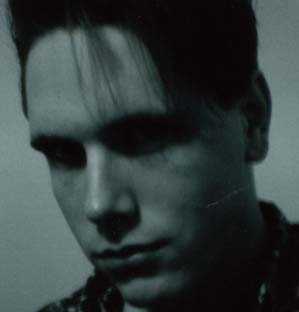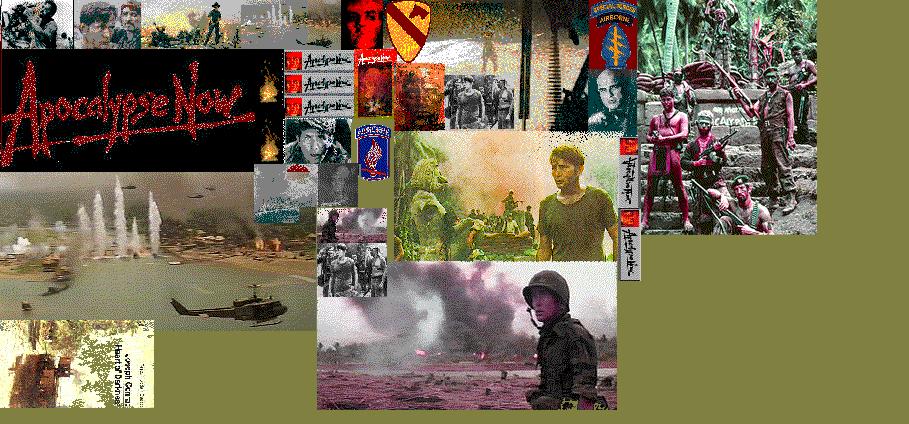Apocalypse Now (1979)
(Release Date: August 15, 1979)(Release Date: August 3, 2001 [Redux Version])










J.C. Maçek III
American Cinema 490
Robert Alford
Apocalypse Forever
Joseph Conrad’s 1902 novel Heart Of Darkness is the striking story of Captain Marlow, an English ship captain who is sent into Africa to track down and collect the debts of an ivory trader identified as Mister Kurtz, a man who may or may not have gone insane along his eventful journey (Conrad). In this novel Marlow is faced with treachery from the Company, hostile as well as friendly natives, and the impending meeting with Kurtz himself. Marlow becomes obsessed with meeting Kurtz and communicating with him after reading the personal history of the man, and hearing all the remarkable stories about Kurtz told by Englishmen and Africans alike (Conrad). This fascinating story is the one that inspired original screenwriter John Milius to write the first drafts of Apocalypse Now in 1969 (Behr). Orson Welles originally planned to write, direct, and star in his own version of Heart Of Darkness back in 1939 (Behr). The problem arose when the Mercury Movie Company pulled out of the project citing Welles’ inability to keep the film to be within their strict budget (Virtanen). Welles decided to give up on the project and decided to make Citizen Kane instead, being serious about his interpretation needing to be shot on location (Behr). Marlon Brando - Colonel Walter E. Kurtz
Martin Sheen - Captain Benjamin L. Willard
Robert Duvall - Lieutenant Colonel Bill Kilgore
Frederic Forrest - Chef
Sam Bottoms - Lance
Laurence Fishburne - Clean
Dennis Hopper - Photojournalist
Harrison Ford - Lucas
Albert Hall - Chief
Cynthia Wood - Playmate of the Year
Colleen Camp - Miss May (Playmate)
Linda Carpenter - Playmate
The film was originally intended to be filmed in 1969, on location in Vietnam during the war, using 16 millimeter film with George Lucas as the director. Warner Brothers backed out of the project, fearing that no one would survive the filming (Behr). Due to the controversy surrounding the war, no other studio would touch the script for any reason. When Coppola reunited his film group American Zoetrope in 1975, they all decided to do Apocalypse Now as their first project (Behr). The start of filming was not the end, but the beginning of the trouble surrounding the film. Filming began in February of 1976 on Apocalypse Now, which was intended to have a sixteen week shoot (Behr). Around this time Coppola’s doubts began arising about the film’s integrity as a work of art (Behr). Coppola’s wife said that Francis went into himself to confront his own demons in order to make the film. Coppola’s biggest fear was to make a second-rate film on an important subject, and he seemed bent on avoiding this travesty. Coppola saw his work as a twenty million dollar disaster, that was sure to receive an "F" on any filmic grading scale (Behr). Coppola admitted to having even considered shooting himself, or causing himself to have a great accident in order to get out of the horror he had placed himself in (Behr). One item of interest surrounding the film was that the Coppola met with Ferdinand Marcos to arrange to use the Philippine Army’s attack helicopters in the shooting of the film. This, coupled with the Philippine terrain, which was so similar to the terrain in Vietnam, added to the realism of the work, however this caused more problems. There was a group of Communist rebels gaining ground in the south, These choppers had to frequently be pulled out in the middle of shooting in order to battle the rebellion (Behr). The constant rotation of Philippine troops caused a different group of pilots, who needed training and pay, to be sent each day (Behr). The rebels also gained round near the filming site, adding a hint of danger and realism to the set, as the very lives of the cast and crew were in real danger from the rebels only ten miles away (Behr). Acts of God played a part in the film’s continuing troubles. A monsoon hit the Philippines during principle photography, demolishing sets, and making the terrain harder to film on (Behr). Production was closed for two months in order to rebuild the ruined sets (Behr). This delay also caused Brando to threaten to back out and keep his million dollar bonus. After tense negotiations Brando stayed, but the film was drastically over budget. United Artists agreed to put up three million dollars toward completion of the film, under the contingency that Coppola pay the sum back if the film made less than forty million dollars at the box office (Behr). Coppola also chose to cut scenes that he found to be less than perfect, such as the French plantation scene. In this scene Coppola began to show Willard’s journey back in time, starting with the remnants of the French who had remained in the heart of Vietnam since 1950 (Behr). Coppola went to great lengths to ensure this scene’s accuracy, right down to the temperature, and breathe time of the different French wines (Behr). Coppola was dissatisfied with a few minor portions of the expensive scene and decided that "it never happened" (Behr). This showed Coppola’s dwindling state of mind, and his impending insanity. To contribute to this, the film’s original sixteen week shoot ended up extending to two hundred thirty eight days (Behr). The United Artists Company was pushing for the release of a film that was not yet ready, and whose director was convinced that it was "a bad film" (Behr).
Perhaps the most visible problems Coppola had with his film were those he had with his actors. Brando was "an incredible joker to play!" (Behr), in Coppola’s own words, and he demanded frequent script rewrites, as well as constant time and attention. Other actors such as Sam Bottoms, who played Lance B. Johnson, were almost constantly under the influence of amphetamines, marijuana, LSD, alcohol, and other drugs (Behr). Actors such as Dennis Hopper continually argued with Coppola, and refused to bother learning the lines (Behr). But the most trouble surrounded the character of Willard. Harvey Keitel was originally cast as the Special Forces captain and was even filmed in the Philippines in this role (Behr). However, once Coppola and the producers sat down to view the footage of Keitel as Willard, they all agreed within fifteen minutes that Keitel was to be replaced (Behr). Coppola flew to Los Angeles to recruit Martin Sheen to play the part of Willard (Behr). Sheen was concerned about his own abilities to play such a role, and voiced these opinions. "Who is this guy Willard?" (Behr), Sheen would ask. "He’s you, Whoever you are." (Behr), Coppola would reply. During the opening sequence showing Willard alone in a Saigon hotel room the ever improvisational director allowed Sheen to get drunk and play the entire scene out without any real cues as to how to play the part (Behr). The scene got so intense that Sheen actually punched a mirror, badly injuring his hand (Behr). While Coppola insisted that the scene end there and that Sheen seek medical attention, Sheen was adamant about finishing the action and displaying Willard’s animalistic, primal side (Behr). The strife was so intense at that moment that Sheen actually screamed profanities at the director, and physically threatened to charge the camera and actually attack Coppola (Behr). The sound track of this real life footage was removed in favor of a musical overlay of a Doors song. This added to the illusion that this was Willard’s struggle, not Sheen’s dealing with his own "chaotic spiritual state" (Behr). "It had to do with facing my worst enemy: Myself.", said Sheen (Behr). Sheen’s confused state was not exclusive to this scene. Sam Bottoms called Sheen an "extremely generous, big hearted man, filled with a lot of love, and much unlike Willard. And so when you ask Marty [Sheen] to examine the darker nature of this character it meant closing himself down a lot and becoming very inward in order to find the killer who could carry out the task and terminate Kurtz. I think that Willard was responsible for Marty’s breakdown." (Behr). This breakdown came when Sheen suffered a severe heart attack and literally faced death (Behr). So close was Martin Sheen to death that he actually received last rites from a priest that did not speak English (Behr). Amid Coppola’s near insanity, he tried to cover up Sheen’s attack so that Hollywood would not hear of it. He pushed Sheen to do close ups, and other non strenuous work in order to keep the film going (Behr). They used body doubles, and over the shoulder shots, matting Sheen in later, to continue filming. So adamant that the film be competed Coppola told his staff "If Marty dies I want to hear that everything’s okay until I say Marty is dead!" (Behr).
"A film Director is one of the last truly dictatorial posts left in a world that is becoming more and more democratic.", said Coppola of his experiences with the film (Behr). Perhaps this is the reason that Coppola finished the film the way he did, and when he did. After thirty eight takes of the last sequence alone (none of which pleased him), two hundred thirty eight days of shooting, dwindling psychological stability, and "a hundred problems a day" (Behr), Coppola was left with a film whose incoherent ending did not match the rest of the plot or itself, and was drastically deviant from any script associated with it (Behr). At this point amid thoughts of suicide, and other serious expressions of depression, Coppola decided to take what he had and develop into something that he enjoyed. This setting of himself up as his own selfish audience, and choosing to please himself rather than the actors, producers, critics, distributors, or public caused this film to be a true expression of Coppola’s heart and mind rather than what anyone else chose to think it should have been. The film opened on August 19, 1979, and it grossed one hundred fifty million dollars worldwide (Behr). The film won three Golden Globes, two Academy Awards, and the Palme D’or at the Cannes Film Festival (Behr). Coppola’s twenty million dollar disaster was quite a success (Behr).
While all signs pointed to Apocalypse Now’s sure failure, that failure never came. Francis Ford Coppola not only did not receive the "F" he assured himself that he would, he created a film that is uniquely his, and that remains loyal to its many parents, but also reflects Coppola’s inner self unlike any other artists mirror.
Works Cited
Behr, Fax (Writer, Director), & Hickenlooper, George (Writer, Director). 1992. Hearts of Darkness: A Filmmaker’s Apocalypse [Film]. Showtime/ Paramount.
Conrad, Joseph. Heart of Darkness & The Secret Sharer. 1986. Buccaneer Books, inc. Cutchogue, NY.
Coppola, Francis Ford (Director, Co-author). 1979. Apocalypse Now [Film]. American Zoetrope/ United Artists.
Virtanen, Panu S. (1997). Apocalypse Now Tribute Page. Retrieved July 2nd, 1997 from the World Wide Web: http://www.geocities.com/Hollywood/9067/apocal.html.
Apocalypse Forever

J.C. Maçek III
The World's Greatest Critic!
Francis Ford Coppola's magnum opus Apocalypse Now was laded with problems and difficulties before and after filming. These problems ranged from those having to do with the cast and crew, to those having to do with the circumstances surrounding the filming, to those having to do with the script, to those dealing in direct regard to the very sanity of all of those involved with Apocalypse Now. Despite the myriad of problems that contributed to this acclaimed film’s failure, Apocalypse Now still became a success in its own right, and a true classic by any director’s standards.
This and other factors led to the belief that Heart of Darkness could not be successfully written, much less produced (Behr). A college film student at the time, Milius took these notions as a challenge to write his own interpretation of Conrad’s Heart of Darkness combined with what he knew of then current events (Behr). Milius elected not to attempt to redo or top Conrad’s original novel, and decided to modernize it with his own flavor set into the script. This modernization included the resetting of the story into the midst of the Vietnam War with Marlow replaced by a Special Forces Captain named Willard. This tale became one of excess, greed, insanity, and psychadelia, which commented more on the state of the Vietnam experience than on what Conrad, who wrote his work fifty years prior to the beginning of the Vietnam strife, had originally intended. Milius called the script a cross between Heart of Darkness and The Odyssey, with Kilgore (portrayed by Robert Duvall) as the mighty Cyclops, who must be tricked, and overcome in order for Willard to continue his journey, and the Playboy Bunnies as the Sirens, who lead Willard and his men into distraction and decadence, rather than their watery graves (Behr). Other influences on the original script included "Michael Herr’s article ‘The Battle of Khe San’, referring to drugs, rock’n’roll etc. in the Vietnam war." (Virtanen), as well as John Milius’ collected anecdotes from Vietnam war veterans he knew personally (Behr). Milius says, "I wrote the screenplay in 1969, and based the Sheen Character [Willard], and some of Kurtz, on a friend of mine, Fred Rexer, who actually experience the scene (in Kurtz’ horror monologue) where the arms are hacked off by the Vietcong." (Virtanen). Despite Milius’ intentions, Coppola had other Ideas of how his script should turn out. Coppola began rewriting the script in 1975, wishing to explore "more the moral side and got inspiration from Sir James Frazer’s The Golden Bough: A Study in Comparative Religion, and From Ritual to Romance by Jessie Weston." (Virtanen). These added elements dragged the story farther away from Conrad’s and Milius’. Coppola was also an advocate of improvisation. With the situations experienced by the cast and crew so similar to those of the actual veterans, Coppola felt that it was important to get real responses from real people. He chose to set a feel for his "scenes unknown", then have the actors improvise what was going to happen (Behr). Coppola also had these actors make lists of what they felt that their characters should do in different situations (Behr). This caused an effect of the script writing itself, as well as creating a deeper rift between it and the source material. Marlon Brando, who portrayed Kurtz, fed the fire of deep confusion where the script was concerned. Both Heart of Darkness, and Milius’ original script, as well as Coppola’s later interpretation of these, called for the character of Kurtz to be a frail, sickly, and dying man. Brando, however, refused to get into shape as Coppola had requested. Brando was in fact so fat during filming that he was shy about it (Behr). Coppola first suggested that he rewrite the script to accommodate the character to Brando by setting him up as a gluttonous, man consumed by his own evil excesses (Behr). Brando refused to be undignified in his portrayal, so the filming, as well as the writing remained stagnant for days on end. In the end Coppola merely set Brando and Sheen free to improvise for three weeks, leaving him with an incoherent batch of footage that, with the exception of the death lines of "’The Horror! The Horror!’" (Conrad) had little to do with the script, or the novel. Time and money restraints forced Coppola to leave this as what it was, and try to get it straight in the editing (Behr). Coppola still felt that the ending was weak, and lacking of any answer to the moral issues the script posed, but he was powerless to do any thing about this with uncooperative actors and a distributing company demanding Apocalypse Now’s release (Behr). In spite of the many changes both attributed to Coppola, and to outside forces John Milius said, "Even had I written every line of every scene I could not have realized it on screen in the way Francis did." (Virtanen).

Out Cast:
Where to Now?
More NonFiction?:
Back to the Fiction?:
More Reviews?:
Apocalypse Forever written by J.C. Maçek III who is solely responsible for the content and opinions on this page unless where otherwise parenthetically noted! He is also responsible for some other things he might tell you about if you ask nicely!





